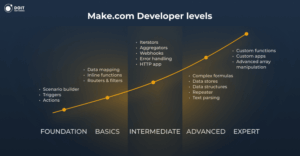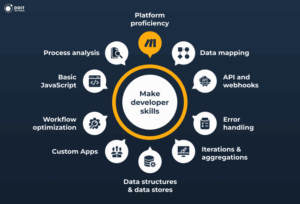A Make.com developer, often referred to as a Make expert, is a professional who builds and manages automated workflows using the Make platform. They connect different software to communicate and exchange data without manual intervention. In fact, their primary goal is to cut repetitive tasks and automate business processes.
In this article, you’ll find out what skills define a professional Make.com developer and how they progress from beginner to expert level. We’ll break down the platform’s learning path and take a detailed look at the top ten Make developer skills needed for modern automation projects.
Let’s start with how developer experience level aligns with their Make.com skills.

Make provides a structured path for learning the platform, and its levels offer a valuable framework for understanding a developer’s expertise. As a Make specialist progresses through these levels, they move from building linear automations to advanced multi-path scenarios. Let’s take a look.
Here is a summary of how Make developer skills progress through each Make partner training level:
Foundation
• Understanding of Make.com platform (scenario builder, triggers, actions)
Basics
• Data mapping and transformation
• Use of inline functions
• Building routers and filters for conditional flows
Intermediate
• Workflow logic with iterations, aggregations, and arrays
• API integration and webhooks
• Error handling and debugging
• Working with HTTP modules
Advanced
• Complex conditional formulas
• Advanced iterations and aggregations
• Advanced error handling strategies
• Proficiency in Data Structures and Data Stores
• Repeater usage
• Text parsing for structured/unstructured data
Expert
• Testing and validating webhook payloads
• Advanced array manipulation
• Development of Custom Functions
• Building Custom Apps or Make apps

A professional’s expertise with Make begins with core platform proficiency. To develop effective automation, they must understand and use the following basic elements:
When a Make developer transitions from an entry-level position, they must also show expertise in more advanced aspects of the platform, including routers, filters, inline functions, arrays, iterators, and the HTTP module. We will cover some of these in more detail below.
Once a Make developer can build a basic workflow, they need to manage the data that flows through it. Strong data mapping is, in fact, one of the most fundamental Make developer skills, as it ensures data from one application is correctly transferred to another.
But it’s rare that information from one source is in the exact format another tool needs. So, every competent Make expert should be able to:
Moving forward, every Make developer should be familiar with APIs and webhooks. An API is a set of rules that allows different software applications to communicate with each other. A webhook is a specific type of API call that sends data from one app to another in real time, triggered by an event.
You’ll need a specialist with these skills when you want to integrate with a tool or service that doesn’t have a pre-built connector. A skilled Make developer knows how to read API documentation from any third-party service and use Make’s HTTP module to communicate with it.
Next, a Make developer should be able to implement sophisticated error-handling logic. Make provides several directives for this, and the candidate should know when and how to use them.
They should demonstrate experience with:
Advanced Make developer skills also include working with custom error handlers. For example, a specialist can build custom logic paths that trigger when an error occurs, such as sending a notification or logging the error.
While many business tasks can be automated with simple “if this, then that” rules, some processes require more sophisticated logic. A skilled Make developer uses a specific set of tools within Make to build advanced workflows. Here are some of the key tools they master:
As your automations become more complex, you’ll often need a place to store data. In this case, a Make developer skills in data stores and external databases become a huge asset.
Make.com offers a built-in Data Store, which is great for simple key-value storage. A Make developer uses Data Structures to define a specific format for storing data, and then uses Data Stores to save records that follow that structure.
Besides, Make.com expert skills should include familiarity with external data sources (often Airtable or Google Sheets) and SQL databases (e.g., MySQL, PostgreSQL), allowing workflows to interact with existing companies’ data warehouses.
When an organization needs to integrate a niche SaaS tool or an internal system not covered by Make’s official catalog, a Make developer can build custom components. They can extend the platform in several ways, each requiring a different level of technical expertise.
First, a Make developer can write Custom Functions (small snippets of JavaScript code) that perform transformations or calculations beyond what built-in functions allow.
For more complex needs, they can build a brand-new, private app connector (Custom App) for any service that has an API. This app can contain its own custom triggers and actions tailored to your internal tools.
And finally, a Make developer can use the Make App SDK (Software Development Kit) to build a full-fledged integration. These apps can remain private or, after review and approval, be published to the Make App Marketplace for public use.
To handle custom apps, Make developer skills should include experience with Make’s Custom Apps Editor and SDK, proficiency in JavaScript/IML, understanding of API design (authentication, endpoint design), and solid testing & version control practices.
Workflow optimization is the process of analyzing and refining a Make scenario to ensure it runs as quickly and cost-effectively as possible. Since Make’s pricing is based on the number of “credits” a scenario consumes, an optimized workflow can directly lower your subscription costs.
A Make developer skilled in optimization actively looks for ways to reduce the number of steps a scenario performs. For example, they can place filters as early as possible in the workflow to stop unnecessary actions from running. They can also design scenarios to read and write data in batches, rather than one item at a time.
Check out our article “n8n Developer Job Description: Role, Responsibilities, and Skills”
As we have already discussed, while Make is a low-code platform, having basic coding skills can significantly enhance a developer’s capabilities. In practice, Make.com automation specialist skills should include proficiency in:
You don’t need to hire a full-stack software engineer, but a Make developer who isn’t afraid to write a few lines of code to solve a problem is far more effective than one limited to only the visual tools.
Finally, and perhaps most importantly, a top-tier Make developer should have a strong analytical mindset to analyze business processes. They should be able to understand operational challenges, map out existing tasks, and design an automated solution that addresses real pain points.
To build practical Make.com consultant skills, they often spend time observing how a business team operates on a day-to-day basis. From there, they map out existing processes step by step and highlight which tasks are repetitive or time-consuming. Many also run small trial automations to test their assumptions before scaling a full solution.
You can usually spot a Make developer with strong process analysis skills by the way they present their portfolio or describe past projects. During the hiring process, it’s also helpful to give a short test assignment where they need to review a sample process and suggest how to automate it.
And that’s a wrap! We hope this guide gave you a clear picture of the core Make developer skills required for projects in 2025 and how they progress from beginner to expert. Now it’s time to decide which level of expertise your business needs and take the next step toward smarter automation. A good starting point is reviewing a Make developer job description, which outlines the requirements and responsibilities to look for.
If you’d like to explore hiring options or get dedicated Make.com experts for your projects, reach out to us for a free consultation. Let’s find the best automation talent that fits your business together!
Get a consultation and start building your dream team ASAP.
Request CVsNo, you can build powerful automations on Make.com without writing any code by using its visual interface. However, advanced Make developer skills often include a basic understanding of JSON for handling API data and light JavaScript for complex data transformations or custom solutions.
Make Academy offers a free, structured path for learning the platform, with courses ranging from foundational to expert levels. For example, the academy teaches how to navigate the platform, map and transform data, work with routers, arrays, iterators, and other advanced logic, as well as integrate with APIs and webhooks.
To start, complete the Make Academy or Make Partner training courses to build a strong theoretical foundation. Then, start designing real-world automations to practice and build a portfolio. Try to master more advanced Make developer skills like API integration, error handling, and data parsing. Also, remember to stay updated on platform changes and new features.
In addition to the ten core skills, top Make developers should know how to test, debug, and document their workflows. They require expertise in authentication and security practices, as well as experience in integrating modern AI tools and LLMs into automated processes. Many Make developers also know complementary platforms like Zapier or n8n to cover broader automation needs.










